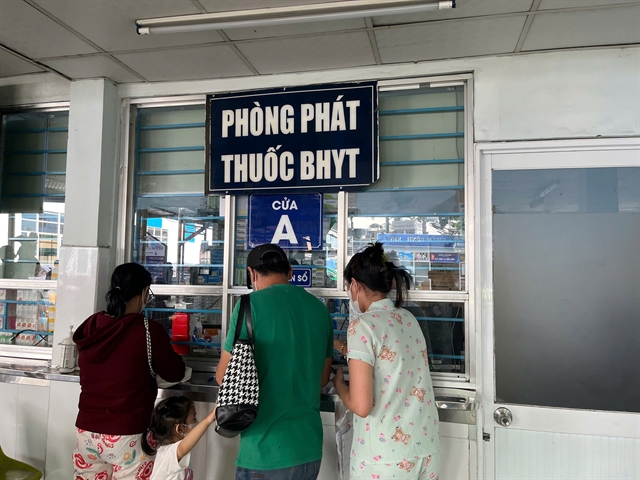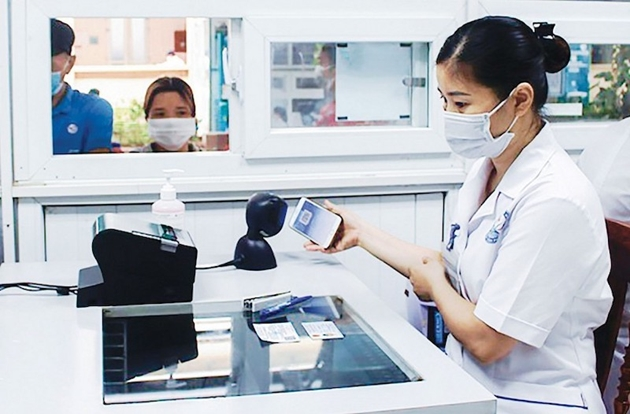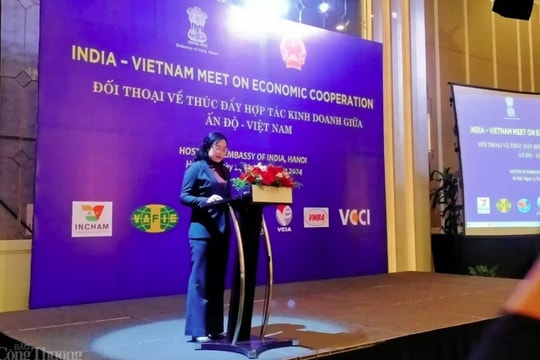 |
| In 2025, the Ministry of Health will focus on developing and implementing a system of guiding documents for the amended Law on Pharmacy, the amended Law on Health Insurance, in coordination with the Law on Medical Examination and Treatment, among others. Photos suckhoedoisong.vn |
HÀ NỘI - In 2025, Việt Nam’s Ministry of Health aims to spearhead reforms in the healthcare system with a focus on improving service quality, ensuring vaccine availability and bolstering patient satisfaction.
Alongside this, the ministry will propose equitable incentive policies for healthcare workers as part of the broader national salary reform plan.
Key priorities include enhancing healthcare legislation, optimising organisational structures and advancing the digital transformation of healthcare services.
Completing legal frameworks
According to Deputy Minister of Health Lê Đức Luận, in 2025, the Ministry of Health will prioritise achieving three key targets assigned by the National Assembly in the socio-economic development plan: 15 doctors per 10,000 people, 34.5 hospital beds per 10,000 people and 95 per cent health insurance coverage. Additionally, the government has set seven sector-specific targets for the ministry.
To meet these targets, the ministry will expedite reforms in legal and institutional frameworks to address challenges and develop a sustainable healthcare system. It aims to ensure the timely and quality completion of draft laws, policies and plans included in the National Assembly's 2025 legislative programme and the government's work plan.
Key legislative efforts include developing regulations to guide the amended Law on Pharmaceuticals, the revised Law on Health Insurance and the new Law on Medical Examination and Treatment. Other legislative priorities include drafting laws on disease prevention, population, medical devices and food safety. The ministry also plans to integrate healthcare-related content into the socio-economic report for the 14th National Party Congress.
In addition, the ministry will reorganise its organisational structure to ensure it is "streamlined, strong, efficient, and effective," in line with the directives of the Central Steering Committee and the Government Steering Committee. This includes implementing the healthcare network planning for 2021–2030, restructuring hospitals under the Ministry of Health for 2023–2030 and enhancing administrative reforms, decentralisation and resource allocation.
Ensuring vaccine availability
In 2025, the Ministry of Health will closely monitor disease outbreaks globally and regionally, enhance forecasting and surveillance capabilities, and proactively manage public health emergencies. The ministry aims to ensure the availability of vaccines and maintain a vaccination rate of over 90 per cent under the expanded immunisation programme, while implementing a roadmap to include more types in the programme.
Additionally, efforts will focus on managing and treating non-communicable diseases, mental health disorders, occupational diseases and injuries. The ministry will continue to improve national capacity for ensuring food safety and environmental health. A key aspect of this strategy is the timely response to challenges such as emerging diseases and maintaining the continuity of essential health services.
The ministry will also complete the development of proposals to adjust birth rates in accordance with regional and demographic targets by 2030, ensuring a sustainable national replacement fertility rate. Special attention will be given to maternal and child health, healthcare for the elderly and addressing gender imbalances at birth. It will also explore policy frameworks to adapt to population ageing, aiming to extend life expectancy and harness the benefits of the demographic dividend.
In clinical care, the ministry will intensify efforts to improve healthcare quality and patient satisfaction. This includes expanding the satellite hospital model, implementing remote healthcare initiatives and advancing the transfer of technical expertise to local facilities. Efforts will also include tightening safety protocols within medical institutions and accelerating the licensing processes for medical practices and practitioners.
Furthermore, the ministry will focus on enhancing the integration of traditional medicine with modern healthcare practices, through effective implementation of programmes promoting traditional medicine. These initiatives aim to preserve cultural heritage while addressing the diverse health needs of the population.
The ministry will continue efforts to improve medical services and public satisfaction, including remote consultations, technical transfers and ensuring safety in medical facilities. Expediting the licensing of medical practices and coordinating with local authorities to manage medical professionals will also be priorities.
The ministry will boost domestic production of pharmaceuticals, medical supplies and devices. It plans to ensure adequate supply and fair pricing for drugs, vaccines and equipment while enforcing strict regulations on medical waste management. The target is to process 98 per cent of hospital-generated medical waste in compliance with environmental standards.
 |
| The Ministry of Health continues to promote digital transformation in healthcare, enhance the efficiency of scientific and technological activities, and foster innovation in the health sector. |
Boosting domestic medicine-related industries
The Ministry of Health will implement comprehensive solutions to enhance training, transfer techniques, and rotate healthcare staff to improve the quality of human resources in the healthcare sector, according to the deputy minister. Efforts will also be directed towards advancing research, increasing the effectiveness of scientific and technological activities, and fostering innovation in healthcare. Equitable incentive policies for healthcare workers will be proposed as part of overarching salary reform plans.
The ministry will strengthen management, licensing, and renewal processes to ensure sufficient provision of quality, safe, and affordable drugs, vaccines, medical supplies, and equipment for disease prevention, treatment, disaster response, and emergencies. Special attention will be paid to developing domestic industries in pharmaceuticals, medicinal materials, and medical equipment. Additionally, hospital waste management within and around healthcare facilities will be closely monitored, with strict actions against violations, aiming for over 98 per cent compliance with waste treatment standards.
Further reforms will focus on transforming operational and financial mechanisms within public healthcare units. This includes integrating administrative costs into medical service fees and advancing universal health insurance coverage. Strategies to mobilise resources and expedite healthcare investment projects will be prioritised.
Efforts will also aim to maximise investment efficiency and financial autonomy at healthcare facilities. Revisions to regulations concerning health insurance coverage for drugs, chemicals, medical supplies, and technical services will ensure participant benefits and align with professional standards across healthcare levels.
Advancing digital transformation
In 2025, the Ministry of Health will significantly prioritise digital transformation to improve healthcare access, efficiency, and innovation. Key initiatives include establishing robust legal frameworks specific to the unique needs of healthcare-related digital systems. This includes refining standards for electronic health records, telemedicine platforms, and data security to ensure comprehensive patient care.
The ministry will also develop competency standards for healthcare professionals tailored to the digital age and ensure alignment with modern healthcare demands. It will encourage academic and professional institutions to integrate digital tools into training curriculums, with particular emphasis on supporting healthcare workers in underprivileged and remote regions.
Digital transformation efforts will extend to administrative processes, including the development of an integrated platform for managing healthcare resources, patient data, and medical equipment. The ministry will also enhance public access to healthcare information by improving the functionality and user experience of online portals.
Further, the ministry plans to expand its collaboration with international partners, leveraging global expertise to incorporate best practices in digital health. This will include participating in multilateral forums such as ASEAN, WHO, and APEC to exchange knowledge and foster joint initiatives in digital healthcare.
Lastly, the ministry will prioritise community engagement in its digital transformation agenda. Through awareness campaigns, training programmes, and public forums, it aims to equip citizens with the knowledge and skills needed to navigate digital healthcare services effectively. By integrating these advancements into everyday practices, the Ministry of Health seeks to transform Việt Nam’s healthcare landscape, ensuring better outcomes and accessibility for all. VNS
























